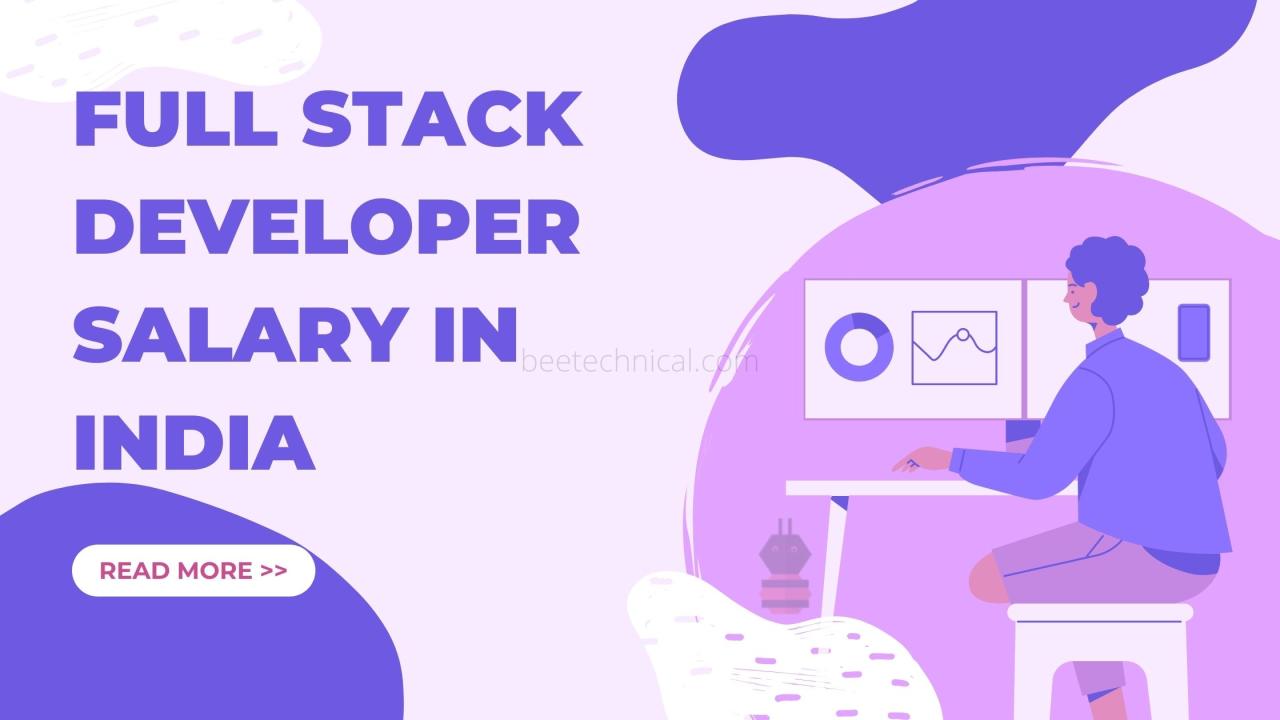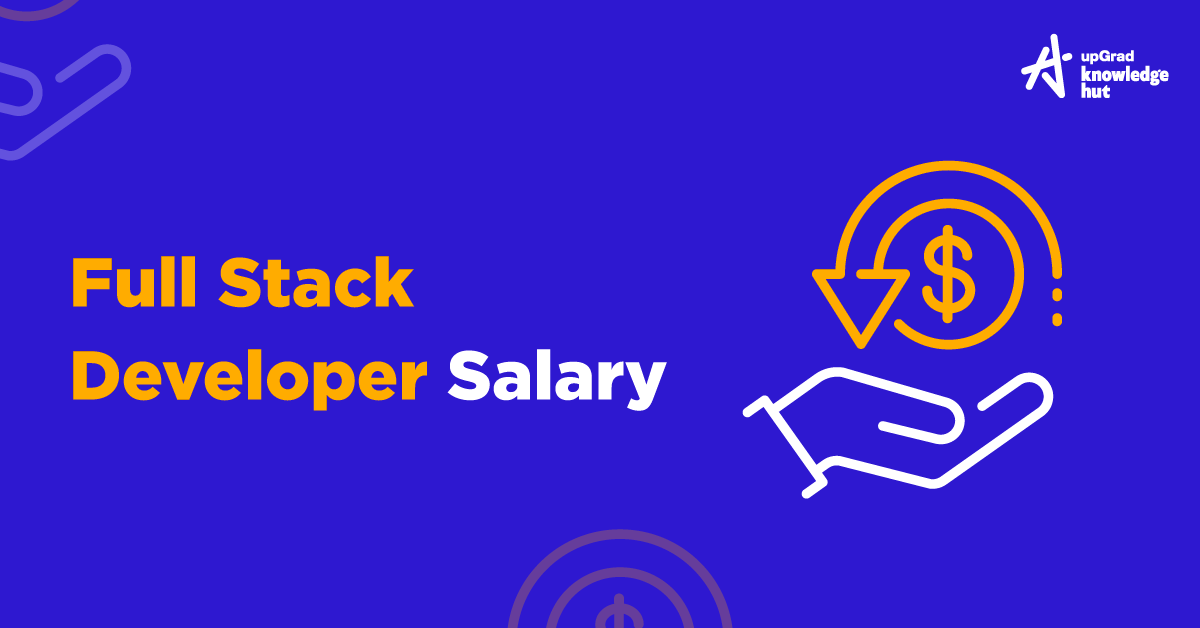Full Stack Developer Salary Expectations and Job Outlook: Want to know what you could earn as a full-stack developer? This guide dives into salary ranges, influencing factors like location and tech skills, and the overall job market outlook. We’ll explore how experience, specific technologies, and even your educational background can impact your earning potential. Get ready to discover the exciting possibilities and challenges of this in-demand career path!
We’ll cover everything from entry-level salaries to the six-figure potential of senior developers, highlighting the key technologies that command top dollar. We’ll also look at the future of the field, exploring trends and factors that influence job availability and salary growth. This isn’t just about numbers; it’s about understanding your career trajectory and making informed decisions about your future.
Salary Expectations by Experience Level
Landing a full-stack developer role can be incredibly rewarding, both professionally and financially. Understanding salary expectations is crucial for negotiating your worth and making informed career decisions. This section breaks down average salary ranges based on experience level, highlighting factors that influence those numbers.
So, you’re thinking about a career as a full-stack developer? Salary expectations are pretty good, and the job outlook is strong. It’s a demanding field, though, requiring diverse skills – much like the acting range of Lee Byung-hun, a true Korean cinema icon, Lee Byung-hun A Korean Cinema Icon , who’s equally captivating in diverse roles.
Returning to the tech world, remember that your potential earnings depend on experience and location, so do your research!
Salary for full-stack developers varies significantly depending on several key factors. Experience is obviously a major one, but location, company size, specific technologies mastered, and even the individual’s negotiation skills all play a role. Let’s delve into the specifics.
Salary Ranges by Experience Level
The following table provides estimated salary ranges for full-stack developers in the United States. Keep in mind that these are averages and actual salaries can vary widely. Data is based on industry reports and salary surveys from reputable sources, but should be considered a general guideline rather than a precise prediction.
| Experience Level | Salary Range (Low) | Salary Range (High) | Average Salary |
|---|---|---|---|
| Entry-Level (0-2 years) | $60,000 | $90,000 | $75,000 |
| Mid-Level (3-7 years) | $90,000 | $150,000 | $120,000 |
| Senior-Level (8+ years) | $140,000 | $200,000+ | $170,000 |
Factors Influencing Salary Variation
Several factors contribute to the wide range of salaries within each experience level. Understanding these factors can help you better position yourself for higher compensation.
Location: Major tech hubs like San Francisco, New York City, and Seattle typically offer significantly higher salaries than smaller cities. The cost of living is a major driver of this difference. For example, a mid-level developer in San Francisco might earn $150,000, while a similar role in a smaller city might pay $100,000. This reflects the competitive job market and higher cost of living in major metropolitan areas.
Company Size and Type: Large tech companies, especially those with significant venture capital funding, often pay more than smaller startups or established businesses in other industries. Startups might offer equity or stock options to compensate for lower initial salaries, while large corporations typically provide more comprehensive benefits packages.
Specific Technologies: Proficiency in in-demand technologies like AI/ML, Blockchain, or specific cloud platforms (AWS, Azure, GCP) can command higher salaries. Developers with expertise in niche areas or emerging technologies are highly sought after and can negotiate better compensation packages.
Geographic Salary Comparisons
Salary expectations for full-stack developers differ considerably across geographic regions. This section illustrates these differences.
Major Tech Hubs vs. Smaller Cities: As mentioned earlier, major tech hubs boast higher average salaries due to intense competition for talent and the high cost of living. Smaller cities often offer a lower cost of living but also lower salaries. A developer might earn $120,000 annually in San Francisco, but a comparable role in a smaller city might pay $80,000 – $90,000.
This difference is not necessarily a reflection of skill level, but rather a reflection of market forces and cost of living.
So, you’re wondering about full stack developer salaries and job prospects? The field’s booming, with great earning potential. To stay ahead, though, you need to keep up with emerging trends, like those showcased at events covering news technology , which often highlights new tools and platforms impacting development. Understanding these advancements will significantly improve your salary expectations and career trajectory as a full stack developer.
International Variations: Salaries also vary significantly across countries. Highly developed nations with strong tech sectors (e.g., Canada, UK, Australia) generally offer competitive salaries, although these may still be lower than those in Silicon Valley. Developing countries, on the other hand, typically have lower average salaries for full-stack developers.
Impact of Specific Technologies on Salary: Full Stack Developer Salary Expectations And Job Outlook

Knowing the right technologies can significantly boost a full-stack developer’s earning potential. The tech landscape is constantly evolving, and mastering in-demand skills directly translates to higher salaries and more lucrative job opportunities. This section explores the impact of specific technologies on a full-stack developer’s salary.
Several factors influence a developer’s salary beyond specific technologies, including experience, location, company size, and performance. However, proficiency in certain technologies can provide a substantial advantage in salary negotiations.
Top 5 In-Demand Technologies and Their Salary Influence
The following technologies consistently rank among the most sought-after by employers, leading to higher compensation packages for skilled professionals. These are not necessarily ranked in order of importance, as the relative value can change based on market trends and specific job requirements.
- JavaScript Frameworks (React, Angular, Vue.js): These frameworks are crucial for building dynamic and interactive user interfaces. Expertise in any of these significantly increases earning potential due to their widespread use in web development.
- Backend Technologies (Node.js, Python, Java): Strong backend skills using popular frameworks like Node.js (JavaScript), Python (Django/Flask), or Java (Spring) are highly valued, enabling developers to build robust and scalable server-side applications.
- Cloud Computing Platforms (AWS, Azure, GCP): Experience with cloud platforms like Amazon Web Services (AWS) is increasingly essential, as many companies are migrating their infrastructure to the cloud. Cloud expertise often commands premium salaries.
- Databases (SQL, NoSQL): Proficiency in both relational (SQL) and NoSQL databases is highly desirable. Understanding database design and optimization is crucial for building efficient and scalable applications.
- DevOps Tools and Practices (Docker, Kubernetes): Familiarity with DevOps tools and practices, such as containerization (Docker) and orchestration (Kubernetes), allows developers to participate in the entire software development lifecycle, increasing their value to employers.
Examples of Technology Proficiency and Higher Salaries
Let’s illustrate how specific technologies can influence salaries with concrete examples. A developer with expertise in React, Node.js, and AWS might command a significantly higher salary than a developer proficient only in basic HTML, CSS, and PHP. Similarly, a developer experienced with Kubernetes and Docker will likely be more highly compensated than one without such skills, especially in roles requiring infrastructure management.
Salary Comparison Across Technology Stacks, Full stack developer salary expectations and job outlook
The following table compares average salaries for developers specializing in different technology stacks. Note that these are averages and can vary significantly based on factors mentioned earlier. The data is based on various salary surveys and job postings.
| Technology Stack | Average Salary (USD) | Salary Range (Low, USD) | Salary Range (High, USD) |
|---|---|---|---|
| MERN Stack (MongoDB, Express.js, React, Node.js) | 90,000 | 70,000 | 120,000 |
| LAMP Stack (Linux, Apache, MySQL, PHP) | 80,000 | 60,000 | 100,000 |
| MEAN Stack (MongoDB, Express.js, AngularJS, Node.js) | 85,000 | 65,000 | 110,000 |
| Python/Django Stack | 95,000 | 75,000 | 125,000 |
Job Outlook and Market Demand

The demand for full-stack developers remains robust, reflecting the ongoing digital transformation across industries. This section explores the current job market and provides insights into the factors influencing future trends. While specific numbers fluctuate based on various economic factors, the overall outlook is positive for skilled professionals.The tech industry’s consistent growth fuels the demand for full-stack developers. Businesses of all sizes require individuals capable of handling both front-end and back-end development, streamlining project management and reducing reliance on multiple specialists.
This demand is further amplified by the increasing complexity of software applications and the ever-growing need for seamless user experiences. However, factors like economic downturns and shifts in technological priorities can influence the market.
Factors Influencing Job Market Growth
The growth or decline in full-stack developer job opportunities is influenced by a complex interplay of factors. Understanding these elements is crucial for anyone considering this career path.
- Technological Advancements: The emergence of new frameworks, libraries, and programming languages constantly reshapes the skills required. For example, the rise of frameworks like React, Angular, and Vue.js has increased demand for developers proficient in these technologies. Conversely, obsolescence of certain technologies can lead to decreased demand for those skills.
- Economic Conditions: During economic booms, businesses invest more heavily in technology, leading to increased hiring. Conversely, economic downturns often result in hiring freezes or layoffs, impacting the demand for full-stack developers.
- Outsourcing and Offshoring: The availability of skilled developers in other regions at potentially lower costs can influence the demand for domestic full-stack developers. This factor necessitates continuous upskilling to remain competitive.
- Automation and AI: While some fear automation might replace developers, it’s more likely to change the nature of the work. AI tools assist with tasks like code generation and testing, freeing up developers to focus on higher-level design and problem-solving. This shift requires developers to adapt and integrate AI tools into their workflows.
- Industry-Specific Demand: Certain industries, such as e-commerce, fintech, and healthcare, consistently show higher demand for full-stack developers due to their reliance on robust and scalable web applications. This fluctuating demand across sectors creates opportunities in specific niches.
Key Trends Shaping the Job Market
Several key trends are significantly impacting the job market for full-stack developers. These trends highlight the need for continuous learning and adaptation.
- Increased Specialization: While the “full-stack” title suggests broad expertise, many developers are increasingly specializing within their front-end or back-end roles. This trend reflects the complexity of modern applications and the need for deep expertise in specific areas.
- Demand for Specialized Skills: Proficiency in cloud computing (AWS, Azure, GCP), DevOps practices, cybersecurity, and specific technologies like blockchain or AI/ML is becoming increasingly crucial, commanding higher salaries and increasing job prospects for those with such skills.
- Remote Work Opportunities: The rise of remote work has broadened the geographic reach of job opportunities for full-stack developers, allowing professionals to work for companies anywhere in the world. This trend has opened up more opportunities but also increased competition.
- Emphasis on Soft Skills: Beyond technical skills, employers increasingly value soft skills like communication, teamwork, problem-solving, and adaptability. These skills are crucial for successful collaboration within agile development teams.
Educational Background and its Influence

Landing a full-stack developer role and commanding a competitive salary isn’t solely about coding prowess; your educational background plays a significant role. While raw talent and self-learning can take you far, formal education and specific certifications can significantly boost your earning potential and open doors to more advanced opportunities.The path to becoming a full-stack developer is diverse, with various educational routes leading to success.
So you’re thinking about a career as a full-stack developer? Salaries are pretty good, and the job outlook is strong, especially with the demand for skilled professionals. While you’re figuring out your career path, you might want to take a break and check out this link: When is Season 3 of Squid Game? Then, get back to researching those lucrative full-stack developer salaries – you deserve a rewarding career and some awesome entertainment!
Let’s explore the common backgrounds and how they influence salary expectations.
Typical Educational Backgrounds of Full-Stack Developers
Full-stack developers often come from diverse educational backgrounds. A significant portion hold bachelor’s degrees, most commonly in Computer Science, Software Engineering, or related fields. These programs provide a solid foundation in computer science principles, algorithms, data structures, and software development methodologies. However, the field is increasingly welcoming individuals from other disciplines who’ve acquired relevant skills. Bootcamps, intensive coding programs lasting several weeks to months, offer a fast-tracked path to acquiring practical skills, making them a popular choice for career changers or those seeking focused training.
Finally, a number of highly successful full-stack developers are entirely self-taught, demonstrating that passion, dedication, and consistent learning can be just as effective as formal education.
Salary Expectations Based on Educational Background
Generally, developers with formal computer science degrees tend to command higher starting salaries than those who are self-taught or come from bootcamps. This is partly due to the comprehensive theoretical knowledge and broader skillset often acquired through a four-year degree program. However, the gap is narrowing. Bootcamp graduates, armed with practical, in-demand skills, often secure competitive salaries, particularly in rapidly growing tech hubs.
Self-taught developers, showcasing a robust portfolio of projects and demonstrable expertise, can also achieve high earning potential, especially if they focus on niche technologies or demonstrate exceptional problem-solving abilities. For example, a recent study showed that entry-level full-stack developers with computer science degrees averaged $75,000 annually, while those from reputable bootcamps averaged $65,000, and self-taught developers averaged $60,000.
So, you’re thinking about a career as a full-stack developer? Salary expectations are pretty good, and the job outlook is strong, especially with the right skills. While you’re planning your future, maybe take a quick break to check out How Many Episodes in Squid Game 2? Then, get back to researching those full-stack developer salaries – you’ll want to know what you’re worth!
These figures are averages and can vary significantly based on location, experience, and specific skills.
Impact of Specific Certifications and Training Programs
While a degree or bootcamp provides a foundational skillset, specific certifications can further enhance earning potential. Certifications from reputable organizations like AWS, Microsoft, or Google, validating expertise in cloud computing, specific programming languages, or database management, are highly valued by employers. These certifications demonstrate specialized knowledge and commitment to professional development, often leading to higher salary offers and increased career advancement opportunities.
For instance, a developer with a bachelor’s degree and AWS Certified Solutions Architect certification might command a significantly higher salary than a developer with only a degree. Similarly, specialized training programs in areas like cybersecurity or artificial intelligence can lead to lucrative career paths within full-stack development. These certifications act as credible signals of expertise, allowing developers to differentiate themselves in a competitive job market.
Skills and Required Expertise
Landing a high-paying full-stack developer role requires a potent blend of technical prowess and interpersonal skills. It’s not just about coding; it’s about understanding the entire software development lifecycle and effectively collaborating with others. The right mix of hard and soft skills is the key to career advancement and a competitive salary.The development of specific skills directly impacts career progression and earning potential.
For example, a developer who excels at problem-solving can tackle complex challenges efficiently, leading to faster project completion and higher value to the employer. Strong communication skills ensure seamless collaboration, reducing misunderstandings and delays. Teamwork facilitates efficient knowledge sharing and accelerates project delivery, boosting productivity and, ultimately, the individual’s value. Conversely, deficiencies in these areas can limit career advancement and salary growth.
Essential Hard Skills
A strong foundation in various technologies is crucial. Proficiency in multiple programming languages, frameworks, and databases is expected, allowing developers to adapt to different project requirements. Experience with various development methodologies, such as Agile, ensures efficient project management and collaboration. Understanding cloud platforms and DevOps principles is becoming increasingly important in modern software development.
- Proficiency in at least one backend language (e.g., Python, Java, Node.js) and one frontend language (e.g., JavaScript, HTML, CSS).
- Experience with popular frameworks (e.g., React, Angular, Vue.js for frontend; Spring Boot, Django, Express.js for backend).
- Solid understanding of databases (e.g., SQL, NoSQL) and database design principles.
- Familiarity with version control systems (e.g., Git).
- Experience with cloud platforms (e.g., AWS, Azure, Google Cloud).
- Understanding of DevOps principles and tools (e.g., Docker, Kubernetes).
- API design and integration skills.
Essential Soft Skills
Technical skills alone aren’t enough. Full-stack developers need to be effective communicators, collaborators, and problem-solvers. Adaptability, critical thinking, and time management are also essential for navigating the ever-evolving landscape of software development. These soft skills often differentiate top performers and command higher salaries.
- Excellent communication skills (written and verbal).
- Strong problem-solving and analytical skills.
- Ability to work effectively in a team environment.
- Adaptability and willingness to learn new technologies.
- Time management and organizational skills.
- Critical thinking and attention to detail.
Most Valuable Skills for Maximizing Earning Potential
The combination of highly sought-after technical expertise and strong soft skills is what truly sets top earners apart. Specialization in areas like cybersecurity, machine learning, or specific industry verticals can further enhance earning potential. Continuous learning and staying ahead of technological advancements are crucial for maintaining a competitive edge.
- Expertise in a high-demand technology (e.g., AI/ML, Blockchain, Cybersecurity).
- Experience with cloud-native development.
- Mastery of multiple programming languages and frameworks.
- Proven ability to lead and mentor junior developers.
- A strong portfolio showcasing complex projects.
- Excellent communication and presentation skills.
Illustrative Examples of Full-Stack Developer Roles

Full-stack developers are in high demand, and the specific roles and responsibilities can vary greatly depending on the company size, industry, and project requirements. This section provides three detailed examples to illustrate the diversity within this career path. Each example highlights the typical day-to-day tasks, required skill sets, and associated salary ranges. Remember that these are illustrative examples, and actual salaries can fluctuate based on location, experience, and company performance.
Full-Stack Developer at a Startup
This role often involves wearing many hats and contributing across the entire software development lifecycle. The developer is deeply involved in all aspects of the project, from initial concept to deployment and maintenance.
- Daily Tasks: A typical day might include designing database schemas, writing front-end code using React or Vue.js, implementing back-end logic with Node.js or Python, conducting code reviews, debugging issues, and collaborating with designers on UI/UX improvements. They may also be involved in DevOps tasks like setting up servers and deploying applications.
- Required Skillsets: Proficiency in multiple programming languages (e.g., JavaScript, Python, Java), experience with various databases (e.g., MySQL, PostgreSQL, MongoDB), familiarity with front-end frameworks (e.g., React, Angular, Vue.js), understanding of back-end frameworks (e.g., Node.js, Django, Spring Boot), and experience with version control systems (e.g., Git) are essential. DevOps skills are also a plus.
- Salary Range: $70,000 – $120,000 per year (USD), depending on location and experience.
Senior Full-Stack Developer at a Large Enterprise
Senior roles often involve more complex tasks, leadership responsibilities, and mentoring junior developers. These developers are typically specialists in their chosen technologies and possess in-depth architectural knowledge.
- Daily Tasks: A senior full-stack developer might focus on designing and implementing complex features, leading technical discussions, mentoring junior team members, optimizing application performance, troubleshooting production issues, and contributing to architectural decisions. They are less likely to be involved in the day-to-day implementation of smaller tasks.
- Required Skillsets: Deep expertise in several programming languages and frameworks, extensive experience with database design and optimization, strong understanding of software architecture principles, experience with Agile development methodologies, and excellent communication and leadership skills are crucial. Experience with cloud platforms (e.g., AWS, Azure, GCP) is highly valued.
- Salary Range: $120,000 – $200,000 per year (USD), depending on location, experience, and specific technologies used.
Full-Stack Developer specializing in E-commerce
This role focuses on building and maintaining e-commerce platforms, requiring expertise in specific technologies and an understanding of the unique challenges of online retail.
- Daily Tasks: A developer in this specialization might work on features like shopping carts, payment gateways, product catalogs, user accounts, order management systems, and integrating with third-party services like shipping providers. They will also focus on optimizing the site for speed and security.
- Required Skillsets: Strong experience with JavaScript frameworks for building user interfaces, expertise in back-end technologies for handling transactions and data, understanding of e-commerce platforms (e.g., Shopify, Magento), experience with payment gateways (e.g., Stripe, PayPal), and knowledge of security best practices for handling sensitive customer data are critical.
- Salary Range: $80,000 – $150,000 per year (USD), depending on location, experience, and platform specialization. Expertise in specific e-commerce platforms can command higher salaries.
Closure
Becoming a successful full-stack developer requires a blend of technical skills, adaptability, and a commitment to continuous learning. While salary expectations vary widely, understanding the factors that influence your earning potential empowers you to make strategic career choices. By focusing on in-demand technologies, building a strong skillset, and staying informed about market trends, you can position yourself for a rewarding and lucrative career in this dynamic field.
So, start building your skills, and watch your earning potential grow!
Top FAQs
What are the downsides of being a full-stack developer?
The demanding nature of the role can lead to burnout if not managed properly. You’ll also need to constantly update your skills to keep up with evolving technologies.
How can I negotiate a higher salary as a full-stack developer?
Research industry averages, highlight your unique skills and experience, and be confident in presenting your value to potential employers. Prepare to discuss your accomplishments and how they’ve benefited previous companies.
Are freelance full-stack developer jobs common?
Yes, many full-stack developers choose freelancing, offering flexibility but requiring strong self-management and business skills.
What certifications can boost my full-stack developer salary?
Certifications from AWS, Google Cloud, and various programming languages can demonstrate expertise and increase your earning potential.